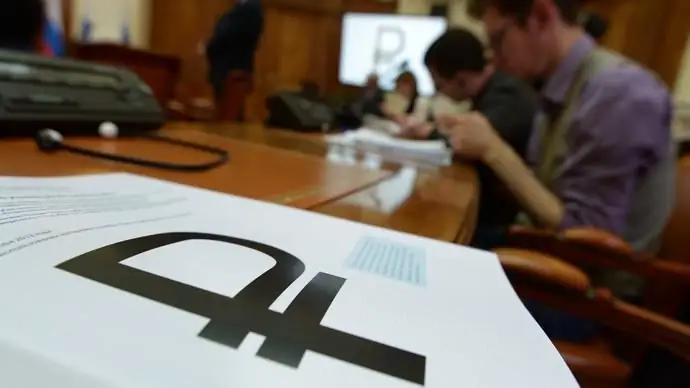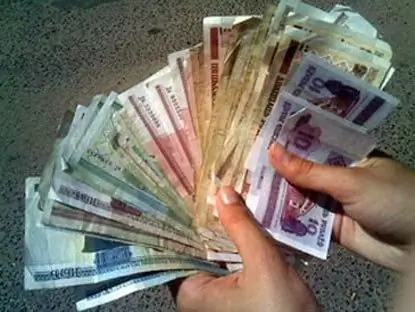2026 Author: Howard Calhoun | calhoun@techconfronts.com. Last modified: 2025-01-24 13:10:47
The question of what a denomination is can be answered in this way: it is a decrease in the nominal expression of banknotes issued by the state. It so happened that the exchange of money - the process is not so rare and mostly unpleasant. Since World War II alone, over six hundred denominations have been held throughout the world. If the country's economy is in a normal state, then this concept is purely technical. The denomination of money becomes more entertaining if accompanied by hyperinflation.

Types of denomination
Note that in some cases this concept refers to the replacement of some banknotes with others, while their face value remains unchanged. There are full and partial denominations. In the first case, all existing denominations are replaced, in the second case, banknotes of one or more denominations are replaced. According to the speed of the processdenominations can be fast, slow, long and perpetual. The first type was extremely popular in Soviet times, and the latter is typical for the United States. According to the impact on the citizens of the country, reforms can be “hard” or “soft”.
What is a Soviet denomination
In 1913, the Russian ruble was a good and respected currency based on the gold standard, but over time it had to go through a lot. In August 1914, the free exchange of paper money for gold was stopped. The State Bank was allowed to issue paper money in unlimited quantities, but within reason. As a result, an amount of two and a half billion rubles was in circulation, and by March 1917 it had increased to 9.9 billion. The interim government, trying to stabilize the situation, increased the speed of the printing press, and the money supply doubled.

The Bolsheviks during this period were obsessed with the idea of the complete abolition of money, but at the same time they printed new, unsecured banknotes even faster than the interim government. But even this was not enough. For this reason, short-term obligations of the State Treasury were issued. There was a small hope that it would be possible to stabilize the economy through the measures taken, but the aspirations were not destined to come true: a civil war broke out. The situation improved slightly only with the proclamation of the NEP, a monetary reform was carried out, the ideologist of which was Sokolnikov G. Ya. Within the framework of the mentioned reform, as many as threedenominations in 1922, 1923 and 1924. The ruble eventually became cheaper by 50 thousand times! At the same time, it was decided to issue bank notes backed by gold - chervonets. Despite this, the old money was in circulation until 1947.
Stalin's monetary reform
What is the Sokolnikov denomination, few people remember, but the reform carried out on December 14, 1947, is probably still alive in the memory of the older generation. The people were given only one week to exchange old money for new banknotes. At the same time, the course was monstrous - 10:1. True, bank deposits were exchanged at a more favorable rate, but few citizens had them. Along with the monetary reform, cards for basic foodstuffs were abolished. All goods could be bought freely, but at markedly increased prices. The people were brazenly robbed, but at the same time, money circulation became stable.

1961 denomination
The reform in 1961 was not particularly necessary from an economic point of view. It was simply one of the periods of the era of "voluntarism". The minting of new coins began in 1958, and new paper units began to be printed at the end of 1959. But what is the denomination of the USSR, the citizens of the country found out only on January 1, 1961, when the exchange rate was again predatory - all the same 10:1. People, remembering the previous reform, rushed to the banks in the hope of making a more favorable exchange, but this time there was no preferential rate. Everyone managed to exchange money, and the number of exchange signs was not limited. True, law enforcement agencies took notice of those who exchanged too many of them, but, in general, the reform passed without noise.
Currency reforms in other countries

The meaning of the word denomination is known in all countries. The exchange of money was used as an instrument of the class struggle on the path of socialism. In the post-war period, a reform was carried out in Poland and the Czech Republic. Each person could exchange no more than 500 monetary units. In those same years in Romania, 20,000 old nominal signs had to be paid for one new leu. There was also a denomination of the Belarusian ruble. In total, since independence, two monetary reforms have already been carried out in this country - in 1994 and 2000. In 2011, the question was raised about the relevance of the third denomination due to the rapid growth in consumer prices, but experts rejected such a need. In addition, the denomination is a complex and expensive project, and the economic situation in Belarus is in no way conducive to this.
Russian reform of 1997

What is a denomination, the Russians found out in August 1997, when the state decided to cross out three zeros on banknotes. As a result, the citizens of Russia instantly turned from millionaires into ordinary poor people. Representatives of the Central Bank in the year of the denomination convinced the people that there is no reason for concern, and the reform is just a technical act to facilitate settlements in the economy, it has neither quantitative nor temporary restrictions. officialsthey argued that the change in the value of banknotes would be a victory over inflation, but in reality it was still too early to talk about the stabilization of the economy. And this became clear already in August 1998 after the financial crisis. During this period, the ruble fell sharply, and inflation reached tens of percent a year.
After the reform, the first Russian president promised that there would be no more new zeros on Russian banknotes. But in 2006, this promise was partly broken with the appearance in circulation of a denomination of five thousand rubles. Whether there will be a denomination of the ruble in Russia in 2014, it is impossible to say for sure. Professional analysts are skeptical about rumors about a possible monetary reform in the country. They say that Russia is not interested in the denomination, since the event is expensive, and there is not enough money in the budget after the cost of the Olympics to hold it.
Why there are rumors about a possible denomination

According to some sources, the rumor about a monetary reform in 2014 is spread by Russian bankers. This can be explained by the fact that as a result of removing extra zeros on banknotes, the inflow of bank deposits will increase, since in such institutions the exchange takes place at the most favorable rate for Russian citizens. But there is another opinion on this matter. Rumors could be spread by re altors concerned about a temporary drop in the cost of housing. Experts say that many citizens still remember previous Soviet-era reforms accompanied by defaults, and theyrush to get rid of cash, investing it in the purchase of real estate. This is a kind of strategic move in an effort to "revive" the real estate market in Russia. But all this is just reasoning, which should be treated, if not skeptically, then at least critically. Finally, we note that in the next two years the denomination is definitely not expected, to a greater extent due to the lack of funds for its implementation. So we can sleep well!
Recommended:
Why does the ruble depend on oil and not on gas or gold? Why does the ruble exchange rate depend on the price of oil, but the dollar exchange rate does not?

Many in our country are wondering why the ruble depends on oil. Why is it that if the price of black gold decreases, the price of imported goods rises, is it more difficult to get out to rest abroad? At the same time, the national currency becomes less valuable, and with it, all savings
Designation of the ruble as a currency. Ruble symbol: symbol on the keyboard

In our time, everyone knows what the designation of the ruble looks like. You can see the symbol of this currency in the article. In it, we will talk not only about its history. We will also tell you about how to enter the ruble symbol in the text input field
Graphic designation of the ruble. International designation of the ruble

The graphic designation of the ruble has the format of the Cyrillic letter "R", which is crossed out at the bottom of the leg. This symbol, developed over the course of 6 years, embodies the reliability of the Russian currency
Why is the ruble getting cheaper? What to do if the ruble depreciates? The ruble exchange rate is falling, what consequences to expect?

We all depend on our income and expenses. And when we hear that the ruble exchange rate is falling, we begin to worry, because we all know what negative consequences can be expected from this. In this article, we will try to figure out why the ruble is getting cheaper and how this situation affects the country as a whole and each person individually
Devaluation of the Belarusian ruble in 2015. What is the devaluation of the Belarusian ruble and how does it threaten the population?

The devaluation of the Belarusian ruble in 2015 will have very serious consequences for the population. The crisis can cover not only the real sectors of the economy, but also the banking sector, real estate

